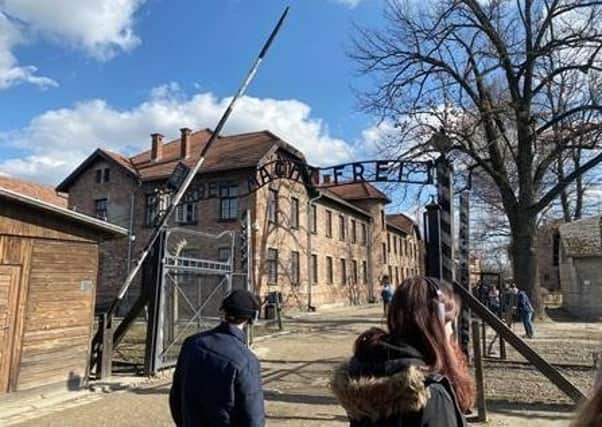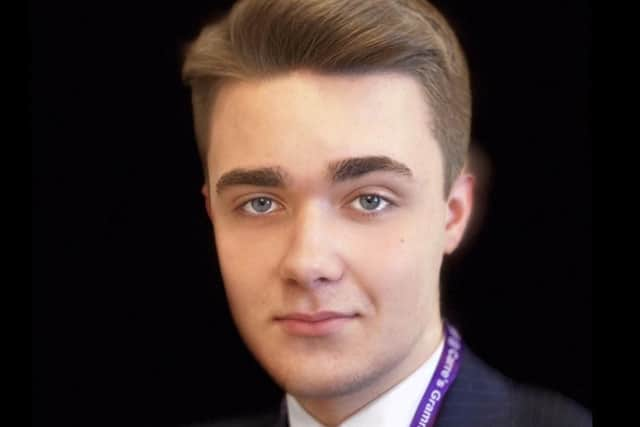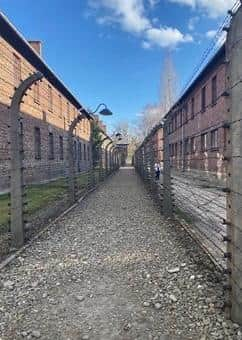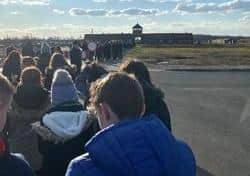VE Day 75 - Sleaford area student’s experience of visiting Jewish death camp: ‘What society can learn from the liberation of Auschwitz, 75 years later’


Charlie Bunker, who attends Carre’s Grammar School and comes from Horbling, travelled as part of a school project with the Holocaust Educational Trust where students around the age of 16 upwards get to meet Holocaust survivors and subsequently visit Auschwitz - a nationwide annual scheme run for young people to ensure that those who lost their lives and the survivors are never forgotten - and that the Holocaust can never happen again.
He said: “Each person has to spread the lessons they have learnt whilst participating in this project. For this, I decided to write an article on the Holocaust, titled ‘What society can learn from the liberation of Auschwitz, 75 years later’.
He writes:
Advertisement
Hide AdAdvertisement
Hide Ad

“As the early afternoon sun pierced through the scattered white clouds, I stepped tentatively under the infamous black metal gates displaying the words ‘Arbeit Macht Frei’ - work sets you free, onto the loose stones beneath my shoes which rigidly led around the symmetrical brick buildings. I had arrived at Auschwitz camp 1. I had heard a lot about the death camps of Auschwitz through my studies of history at school, along with the privilege of hearing multiple survivor’s accounts. But now I was walking in the footsteps of the more than one million people who are to have perished at Auschwitz.
“Between the years 1941 and 1945 one of the greatest human atrocities occurred under the control of the Nazis.
“Across German-occupied Europe approximately six million Jewish men, women and children were systematically murdered. Adolf Hitler, the Chancellor of the German Reich, had developed a strong antisemitic ideology and, as early as the 1920s, had compared the Jews to germs and blamed issues of the time on the Jewish people. ‘The influence of the Jews would never disappear without removing its cause, the Jew,’ said Hitler. These radical ideas paved the way for mass murder through a strategy of the annihilation of the Jewish people of Europe that he would go onto instigate in December 1941. Although he was the architect of the Holocaust and should be remembered for the crimes against humanity he led, Hitler did not invent the hatred of Jews. Jews in Europe had been victims of discrimination and persecution since the Middle Ages and, for example, they were sometimes forced to convert or they would not be allowed to practise certain professions.
“My visit to Auschwitz camps 1 and 2, about an hour’s drive West from Krakow, Poland, was both striking and sad.
Advertisement
Hide AdAdvertisement
Hide Ad

“At the second camp, a few miles from the first, a vast number of wooden huts in which the camp’s prisoners had slowly died inside stretched indefinitely down the site of the largest Nazi death camp.
“Inside the centre of camp 2, also known as Auschwitz Birkenau, runs the aging brown rails which lay beneath the vast stone entrance gate down to where the innocent victims would be selected to be kept alive or killed, based on their health condition and ability to be used for labour. It is an unnervingly noiseless and peaceful place today, with bright green grass now growing in what was once an expanse of mud. Yet this is the location where many families would have seen one another for the last time, where many children were dragged away from their parents into overcrowded and dehumanising huts or the dark concrete structures which were the gas chambers, and it was through the use of the modern railway, poisonous gases and bullets that so many innocent people were able to be remorselessly removed.
“One of the very first accounts of the Holocaust that would reach Western eyes written by a journalist called Varian Fry, who helped many Jewish refugees during the Second World War, strikingly began with: ‘There are some things so horrible that decent men and women find them impossible to believe, so monstrous that the civilized world recoils incredulous before them. The recent reports of the systematic extermination of the Jews in Nazi Europe are of this order.’
“The people who were chosen upon their arrival at Auschwitz to work and more importantly be kept alive, at least a while longer, would be stripped of possessions then forced into standardised uniforms. The huts were breeding grounds for diseases, and it is said that one of the best places to work, if you can call it the ‘best’ in a place of such horror, was in the open-gender communal toilet blocks, as a job here would allow a person to keep themselves a little cleaner. I later walked quietly with my group inside the impersonal but more satisfactory buildings where the officers of the camp would register new arrivals. Here our group’s guide stated that once they had left this room ‘they were now nothing but numbers’.
Advertisement
Hide AdAdvertisement
Hide Ad

“This powerful experience I got at Auschwitz demonstrates the frightening potential of dehumanisation and that when you strip someone of their humanity and, in the case of the Holocaust, into having the identity of just a number, humans become capable of committing awful acts against one another.
“You may have heard of the famous rooms in Auschwitz 1 bluntly named ‘Material Proofs of Crimes’ in which many personal possessions of victims - such as their spectacles and suitcases - are displayed. But for me one of the most
poignant rooms at Auschwitz, which I am sure has left an indelible mark on anyone who entered, was a long corridor, on the walls of which hung hundreds of neatly framed black and white images of just a handful of the people who were held and killed in the camp. This room portrayed one of the key ideas that we must remember about the Holocaust and that is that this atrocity occurred on a human and individual level. You have heard of the numbers, millions were killed, but you have to remember each number was a person, each number was an affected family, each number was someone who may have been.
“Because of the Holocaust humanity unforgivingly lost cultures, communities, customs and ideas, and this room brought to life the personal effect of the brutalities which occurred at Auschwitz and across Europe during the war. Each poor face which hung upon the wall in this corridor, as I looked sorrowfully into their eyes, was someone who lived and loved, yet because of their faith and the intolerance of the time, they were purposely murdered.
Advertisement
Hide AdAdvertisement
Hide Ad

“The abominations which sadly arose under Hitler should be remembered as a unique and unforgettable warning from history. However, mass murder and genocide predate the gas chambers of Auschwitz, and, for example, the British have been involved with similar wicked crimes in the past such as when an estimated two to three million people died in the Bengal famine of 1943 in British-ruled India.
“We must also remember that hatred and bigotry continue to be shown today against entire peoples. Muslims are, for instance, the current target for many of the European far-right and multiple people in British society express unacceptable racial and anti-Semitic abuse. Of course, this is not helped by the rise of social media, but in a country of free-speech we must remember that no one person or persons should be punished because of their beliefs and that as a society we should always endeavour to be open to accept everyone for who they are.
“Seventy-five years after the Red Army’s liberation of Auschwitz, we are lucky enough to have survivors who remain alive today who are able to testify their accounts. We are also lucky enough to have organisations such as the Holocaust Educational Trust which allowed myself and many other young adults to experience and learn about the history and its impact today. At some point there will be no more first-hand accounts of what took place and from listening to survivors we are able to carry their torch into the future, and so I recommend to anyone to try to hear their testimonies. Each account from the few who remain with us further emphasises that the Holocaust should not just be remembered as a situation where many people were killed, but that Jewish people, along with others from all across Europe were taken from their homes and communities, some being lucky enough to escape to foreign countries like England or the United States, but those who didn’t escape were inhumanely starved, punished, experimented-on, broken-down and eventually innocently murdered just because they were different to others.
“I further recommended that every person, if they ever get the opportunity to, must try to visit a place involved with the Holocaust, be it a camp or museum. You may ask why someone would want to visit such a place, well in order for the mistakes of the past to not be repeated we must bear witness to what occurred over 75 years ago in order to spread the message, as the Holocaust is not only a tragedy for the Jewish people, but a failure of humanity as a whole.
Advertisement
Hide AdAdvertisement
Hide Ad“In conclusion, the Holocaust illuminates the consequences of prejudice and stereotyping of a society. It pushes us to scrutinise our duties of social responsibility and challenge the commanding consequences of silence and indifference so that the atrocities that occurred at Auschwitz and throughout the Holocaust never be repeated.
“I would like to leave you with a quote from a survivor of Auschwitz named Elie Wiesel who died in the United States in 2016: ‘To forget would be not only dangerous but offensive; to forget would be akin to killing them a second
time’.”